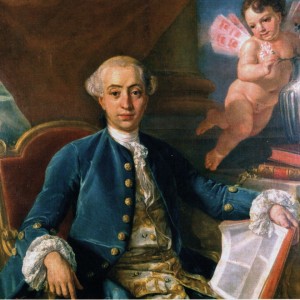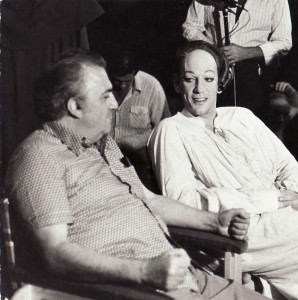Date/Time
Friday, January 22, 2016–Saturday, January 23, 2016
All Day
Location
Royce Hall, Room 314
10745 Dickson Plaza


Please note that the Clark Library is closed for renovations.
In 2015–16 all events are being held on UCLA’s main campus.
—a conference organized by Malina Stefanovska, University of California, Los Angeles, and Thomas Harrison, University of California, Los Angeles
co-sponsored by the UCLA Department of French and Francophone Studies and the Department of Italian
![Logo AFdeLA 1[1]](https://www.1718.ucla.edu/wp-content/uploads/2015/05/Logo-AFdeLA-11.jpg)
Giacomo Casanova is a fascinating eighteenth-century adventurer, libertine, traveler, and author of many texts in French and Italian, including a utopian novel, writings on medicine, economy, language, politics, mathematics, and, most important, one of the major autobiographies of his times, Histoire de ma vie, written in French and published posthumously in an expurgated version. The autobiography of this self-named “chevalier de Seingalt” brings together many strands and interests crucial for the Enlightenment and the eighteenth century at large, including numerous networks such as free masonry, literary salons, and academies; the gambling and theater circuits of Europe; financial expedients, such as lottery, used to finance the State; travel through numerous countries including Spain, England, Germany, Poland, Russia, and the Ottoman Empire; ethnographic observations on customs, languages, and communication, as well as notes on the rulers and courts of Europe; utopian ideas, magic, and free-thinking; libertine perspectives and—last but not least—the novel enterprise of writing one’s life, ushered in by Rousseau’s Confessions. These issues, equally crucial for Casanova as was his status as an exile roaming throughout Europe, anchored him in a unique historical perspective from which he imagined, conducted, and wrote his Life. They also gave him (in spite of the vastly expurgated version of his manuscript, the only one available to the readers until mid-twentieth century) a legendary stature and appeal, creating posthumously a “Casanova myth,” which follows and possibly dwarfs that of the libertine Don Juan (it is noteworthy that Casanova participated in writing Da Ponte’s libretto of Mozart’s eponymous opera). Numerous art, film, and literary representations of Casanova exist in many national traditions in Europe, and he remains to this day a model for libertines and authors.
Casanova scholarship is experiencing a renewal due to the fact that the original manuscript, in possession of the Brockhaus publishing house and inaccessible to scholars, has recently been acquired by France’s Bibliothèque nationale, thanks to an anonymous donor. It has given grounds to an important exhibition on Casanova and his times at the Bibliothèque and to a renewal of literary and historical studies on the author and his involvement in his society. Two major new editions are currently underway in France, including a first edition in the famous Pléiade collection, the first volume of which came out in 2013. This international and interdisciplinary conference brings together historians and literary scholars from the United States, France, and Italy to probe Casanova’s relationship to life-writing, narrative, Enlightenment thinking and practices, and literary representation.
Speakers
Raphaëlle Brin, Université Paris–Sorbonne
Bruno Capaci, Università di Bologna
Michel Delon, Université Paris–Sorbonne
Clorinda Donato, California State University, Long Beach
Jean-Christophe Igalens, Université Paris–Sorbonne
Mladen Kozul, University of Montana
Robert Kruckeberg, Troy University
Pierre Saint-Amand, Brown University
Malina Stefanovska, University of California, Los Angeles
Chantal Thomas, Centre national de la recherche scientifique
Christopher B. White, Independent Scholar
Images
Anton Raphael Mengs (1728–1779), Portrait of Giacomo Casanova, 1760
Federico Fellini and Donald Sutherland on the set of Fellini’s Casanova
Program
Friday, January 22
9:00 a.m.
Morning Coffee and Registration
9:30 a.m.
Barbara Fuchs, University of California, Los Angeles
Welcome
Thomas Harrison and Malina Stefanovska, University of California, Los Angeles
Introductory Remarks
9:45 a.m.
Session 1
Chair: Kate Norberg, University of California, Los Angeles
Raphaëlle Brin, Université Paris-Sorbonne
“‘Triompher par la force’: Sexual Violence and its Representation in Casanova’s Histoire de ma vie”
Mladen Kozul, University of Montana
“Casanova and the Undifferentiated Body”
Discussion
11:15 a.m.
Coffee Break
11:30 a.m.
Session 2
Chair: Natania Meeker, University of Southern California
Clorinda Donato, California State University, Long Beach
“Negotiating Sociabilities in Casanova’s Histoire de ma vie”
Pierre Saint-Amand, Brown University
“Casanova, the Love of Paris”
Discussion
1:00 p.m.
Lunch
2:00 p.m.
Session 3
Chair: Thomas Harrison, University of California, Los Angeles
Robert Kruckeberg, Troy University
“Casanova, Gambling, and the Old Regime”
Malina Stefanovska, University of California, Los Angeles
“Giacomo Casanova Mercury”
Discussion
3:30 p.m.
Coffee Break
3:45 p.m.
Session 4
Chair: Massimo Ciavolella, University of California, Los Angeles
Jean-Christophe Igalens, Université Paris–Sorbonne
“Re-writing, Revolution, Melancholy: Two Versions of the First Stay in Paris”
Bruno Capaci, Università di Bologna
“The Writer of Dux: The Speech of Casanova and of His Ladies from Autobiography to Correspondence”
Read by Thomas Harrison, University of California, Los Angeles
Discussion
5:15 p.m.
Reception
Saturday, January 23
9:00 a.m.
Morning Coffee and Registration
9:30 a.m.
Session 5
Chair: Patrick Coleman, University of California, Los Angeles
Christopher B. White, Independent Scholar
“Fellini’s Casanova: The Story of a Man Who Was Never Born”
Michel Delon, Université Paris–Sorbonne
“From Man to Myth”
Discussion
11:00 a.m.
Coffee Break
11:30 a.m.
Keynote Speaker
Introduction: Malina Stefanovska, University of California, Los Angeles
Chantal Thomas, Centre national de la recherche scientifique
“Paris in Three Movements”
1:00 p.m.
Lunch
2:00 p.m.
Program concludes
Booking Form
Bookings are currently closed for this event.

